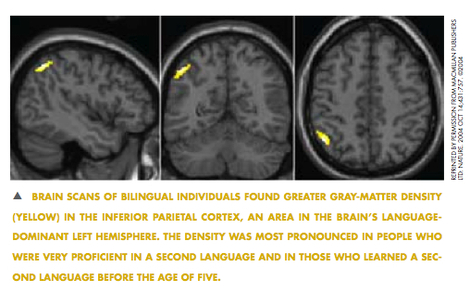
“New research into the neurobiology of bilingualism has found that being fluent in two languages, particularly from early childhood, not only enhances a person’s ability to concentrate, but might also protect against the onset of dementia and other age-related cognitive decline.
Scientists have discovered that bilingual adults have denser gray matter (brain tissue packed with information-processing nerve cells and fibers), especially in the brain’s left hemisphere, where most language and communication skills are controlled. The effect is strongest in people who learned a second language before the age of five and in those who are most proficient at their second language. This finding suggests that being bilingual from an early age significantly alters the brain’s structure.” (Society for Neuroscience, 2008)
That's a long quote but it does say quite compactly what other sources confirm - that learning another language, early and well, improves brain structure and function permanently, in a way that learning other things may not. Surely enhancing the ability to concentrate is something which will have benefits in every area of learning. Rather than being a distraction from "Key Competencies", "Basics" or "Core Subjects", early bilingualism can be seen as "sharpening the axe" before spending the day chopping down a really big tree!

This chart shows what can be achieved in the first 100 hours of education, using different target languages.*
As you can see, the benefits of bilingualism - improved concentration and resistance to dementia in later life - are fully realized by schools offering 100 hours of Esperanto, but not by the other choices.
After the first hundred hours, the choice is wide open again - more so than it was, but that's tomorrow's post!
*The figures are derived from a number of sources including Alex McAndrew, former director of Sydney University's language learning unit, and the US department of defense. They are for motivated adults, and children take a little longer (wonder why? ask me in the comments below!)
 RSS Feed
RSS Feed